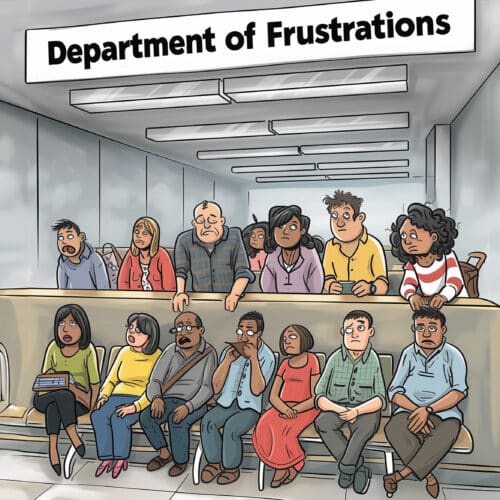“Integrity is doing the right thing, even when no one is watching.” – C.S. Lewis
When you’re tapped on the shoulder as a witness in a workplace investigation, it’s not uncommon to feel like you’ve suddenly landed in a crossfire you didn’t start and don’t want to experience. Unlike the complainant or the respondent, who are likely unhappy but engaged for a reason clear to them, you, as a witness, might find yourself feeling like you’ve been kidnapped and taken to a dark room with an unfriendly bright light and a scowling person who doesn’t care about you and only cares about what you remember.
The Emotional Pain of a Witness
 Imagine this: you’re going about your day, and suddenly, you’re informed about your mandatory participation in a workplace investigation interview. This unexpected turn can trigger a storm of negative emotions. I mean let’s face it. Even if you know what’s going on and you believe you have something important to say, no one enjoys the process of being questioned and having everything you say recorded for use in making formal decisions. Suddenly, all of the “water cooler gossip” you may have engaged in for entertainment comes back to haunt you and you start wondering who told the company that you know what you know. Dangit, you told them not to tell anyone right?
Imagine this: you’re going about your day, and suddenly, you’re informed about your mandatory participation in a workplace investigation interview. This unexpected turn can trigger a storm of negative emotions. I mean let’s face it. Even if you know what’s going on and you believe you have something important to say, no one enjoys the process of being questioned and having everything you say recorded for use in making formal decisions. Suddenly, all of the “water cooler gossip” you may have engaged in for entertainment comes back to haunt you and you start wondering who told the company that you know what you know. Dangit, you told them not to tell anyone right?
Navigate sensitive investigations with expertise.
Discover how our approach balances legal precision and empathetic understanding.
- Confusion and Anxiety: Initially, there’s confusion. Why me? What do they want to know? It’s followed closely by anxiety. Am I in trouble?
- Fear and Intimidation: Walking into the interview, whether it’s by videoconference or a physical room, can feel threatening and intimidating. The fear of repercussions from one of the often several people impacted, whether real or imagined, can be paralyzing. Could your job be on the line?
- Conflict of Loyalty: What if your honest account implicates a colleague or friend? Will you lose their friendship? What if they lose their job? How will their family recover? The inner turmoil between loyalty and truth can be agonizing.
- Pressure and Manipulation: Sometimes, there’s pressure from others involved in the investigation to “remember” events in a certain way. This manipulation can be subtle or overt, but it’s always stressful. And it’s always against instructions. But people don’t care about that as much as they care about outcomes. So, they risk it. And most of the time, they don’t get caught.
Coping as a Witness: Tips for Integrity and
Well-being
 As a witness, processing these emotions while maintaining integrity can be challenging. Here are some tips to help:
As a witness, processing these emotions while maintaining integrity can be challenging. Here are some tips to help:
- Understand Your Role: Remember, your role is to provide factual information based on your observations. You’re not there to speculate or take sides. You’re like a human camera or audio-recorder. You can be neutral and tell the truth as you remember it. Telling facts that are unfavorable to anyone doesn’t mean you are against them or want to hurt them.
- Prepare Mentally: Acknowledge your feelings, but try to separate them from the facts. It’s okay to be nervous or unsure but focus on the truth of what you know. And be prepared to admit your emotions out loud to the investigator. Your interview is not like being in court. There will be no judge there to tell you to just answer yes or no. Getting your story out in a way that supports your dignity as a human being is important to you, and it should be important to the investigator.
- Seek Support: If the process is overwhelming, consider seeking support from a trusted colleague, HR, or professional counseling. It’s essential to care for your mental health. Just don’t ask for it from someone who is involved in the matter in any way.
- Be Honest and Complete: Your responsibility is to provide a complete and honest account. Remember, you’re not responsible for the consequences of the truth, only for sharing it.
Foster a positive organizational culture with the right investigative approach.
Explore how our services make a difference.
For Investigators: Balancing Empathy and Professionalism

Investigators play a crucial role in ensuring the process is fair and thorough. However, they must also remember that witnesses often experience crippling emotions that can interfere with their ability or willingness to tell the whole truth and nothing but the truth.
- Acknowledge Emotions: Recognize that being a witness can be stressful. A simple acknowledgment can go a long way in making witnesses feel heard and respected.
- Provide Clarity: Explain the role of the witness clearly and assure them about the confidentiality and non-retaliatory nature of the process.
- Maintain Professional Boundaries: While empathy is crucial, it’s essential to maintain professionalism. Avoid getting too personal or offering opinions on the matter.
- Offer Support Resources: Inform witnesses about available support systems within the organization, such as HR support or counseling services.
Being asked to interview as a witness in a workplace investigation can be an experience riddled with emotional and practical challenges. For witnesses, it’s about holding onto the truth in the midst of a storm of personal interests, including their own. For investigators, it’s about engaging these human emotions with empathy and professionalism.
“Out of difficulties grow miracles.” – Jean de La Bruyère
Our experts can help guide you through the complexities of workplace investigations.
Reach out to PointerWise for empathetic, legal insights.






